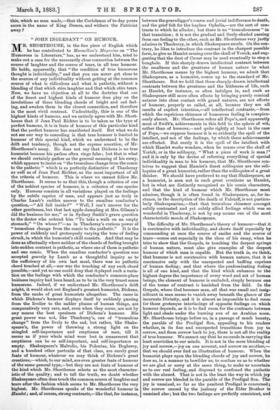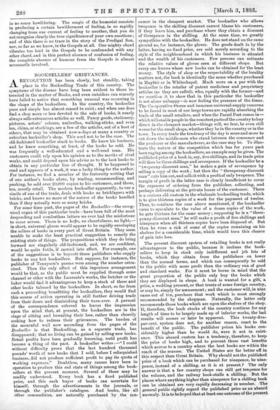" JOHN INGLESAiNT " ON HUMOUR.
MR. SHORTHOUSE, in the fine piece of English which he has contributed to Macmillan's Magazine on "The Humorous in Literature," has, as we understand him, tried to make out a case for the necessarily close connection between the source of laughter and the source of tears, in all true humour. He holds, apparently, that " the condition of true humorous thought is individuality," and that you can never get close to the sources of any individuality without getting at the common source of what is ridiculous and what is pathetic, without a blending of that which stirs laughter and that which stirs tears. Now, we have no objection at all to the doctrine that one of the finest and highest kinds of humour does play on the involutions of these blending chords of bright and sad feel- ing, and awaken them in the closest connection, and therefore in the moat vivid contrast. Undoubtedly, this is one of the highest kinds of humour, and we entirely agree with Mr. Short- house that if Jean Paul Richter is to be taken as the type of perfect humour, it is in feats of humour of this particular kind that the perfect humour has manifested itself. But what we do not see our way to conceding is that true humour is limited to humour of this special kind, which we understand to be the drift and tendency, though not the express assertion, of Mr. Shorthonse's essay. He does not say that Dickens is no true humorist bedanse his pathos often rings false; but that is what we should certainly gather as the general meaning of his essay, which appears to insist on "the tremulous change from the comic to the pathetic " which is so perfectly distinctive of Thackeray as well as of Jean Paul Richter, as the most important of all the criteria of humour. This is where we cannot follow Mr. Shorthouse. It seems to us that this, though a criterion of one of the noblest species of humour, is a criterion of one species only. Humour consists in all variations played on the feelings by the subtle caprice of man, and appears just as truly in Charles Lamb's sudden answer to the omnibus conductor's question,—" All full inside P" " Well, I Can't answer for the other gentlemen, but that last apple-dumpling at Mrs. Gilman's did the business for me;" or in Sydney Smith's grave question to the doctor who ordered him " To take a walk on an empty stomach," " On whose P"—as in Thackeray's curious power of " tremulous change from the comic to the pathetic." It is the power of suddenly and grotesquely varying the tone of feeling struck, in which the humorist's skill consists. And that may be done as effectually where neither of the chords of feeling brought into sudden contrast is pathetic, as where one of them is pathetic and one comic. When the omnibus conductor's question was accepted gravely by Lamb as a thoughtful inquiry as to the sufficiency of his own last meal, there was no pathetic chord touched at all,—nor was the touching of any such chord possible,—and yet no one could deny that it played such a varia- tion on the feelings with which the conductor's common-place business inquiry had been heard, as to be in the very truest sense humorous. Indeed, if we understand Mr. Shorthonse's drift aright, it would shut out England's greatest humorist, Dickens, from the ranks of great humorists altogether. The cases in which Dickens's humour displays itself by suddenly passing from the livelier to the -sadder phases of human things, are comparatively very rare, and, even when they occur, are not by any means the best specimen of Dickens's humour. His great power was not, like Thackeray's, one of "tremulous change" from the lively to the sad, but rather, like Shake- speare's, the power of throwing a strong light on the mingled self-importance and emptiness of men, till it seems as if your whole mind were lost in amazement that emptiness can be so self-important, and self-importance so empty. Shakespeare's Malvolio, his Polonins, his Dogberry, and a hundred other portraits of that class, are surely great feats of humour, whatever we may think of Dickens's great creations,—which, to our mind, are even greater feats of humour of the same general type,—but they are not feats of humour of the kind which Mr. Shorthouse selects as the most character- istic of the quality; and to tell the truth, we doubt whether Shakespeare often does touch the common source of laughter and tears after the fashion which seems to Mr. Shorthonse the very highest. Mr. Shorthouse speaks of the wonderful humour in Hamlet; and, of course, strong contrasts,—like that, for instance,
between the gravedigger's coarse and jovial indifference to death, and the grief felt for the hapless Ophelia,—are the sort of con-
trasts to which he alludes ; but there is no " tremulousness " in that transition ; it is not the gradual and finely-shaded passing from one feeling to the other, such as Mr. Shorthonse very justly admires in Thackeray, in which Shakespeare excels. On the con- trary, he likes to introduce the contrast in the sharpest possible form, to give us Hamlet musing over the skull of Yorick, and sug- gesting that the dust of Caesar may be used eventually to stop a
bunghole. If this sharply-drawn intellectual contrast between the smallness and the greatness of human nature be what
Mr. Shorthouse means by the highest humour, we admit that Shakespeare, as a humorist, comes up to the standard of Mr. Shorthonse. But we hold that these sharply-drawn intellectual contrasts between the greatness and the littleness of life, such as Hamlet, for instance, so often indulges in, and such as Shakespeare still more often effects by bringing purely comical natures into close contact with grand natures, are not efforts of humour, properly so called, at all, because they are all results of explicit intention,—all intellectual contrasts,—from which the capricious shimmer of humorous feeling is conspicu- ously absent. Mr. Shorthonse refers all Pope's, and apparently most of Swift's, achievements in this field to_the sphere of wit, rather than of humour,—and quite rightly at least in the case of Pope,—we suppose because it is so evidently the spell of the intellect, and not of the feelings, by which these achievements are effected. But surely it is the spell of the intellect with which Hamlet works wonders, when he muses over the skull of Yorick, or in the soliloquy, " What a piece of work is man 1" and it is only by the device of referring everything of special individuality in man to his humour, that Mr. Shorthouse con- trives to suggest that Hamlet's finest soliloquies are the soli- loquies of a great humorist, rather than the soliloquies of a great thinker. We should have preferred to say that Shakespeare, as a humorist, is seen not in such great creations as Hamlet, but in what are distinctly recognised as his comic characters, and that the kind of humour which Mr. Shorthouse most admires, though it is often found in Shakespeare, as, for in- stance, in the description of the death of Falstaff, is not particu- larly Shakespearian,—that that tremulous shimmer amongst subtly contrasted and yet subtly allied feelings which was so wonderful in Thackeray, is not by any means one of the most characteristic moods of Shakespeare.
The difficulty of Mr. Shorthonse's theory of humour—that it is coextensive with individuality, and shows itself especially by commanding at once the source of smiles and the source of tears—comes out especially in the close of his essay, when he tries to show that the Gospels, in touching the deepest springs of human nature, must also give examples of the deepest humour of which man is capable. But the truth is, we think, that humour is not coextensive with human nature, that it is coextensive only with the unexpected and baffling caprices of human feeling; and that where the predominating feeling is all of one kind, and that the kind which enhances to the highest degree the importance of every word and act of human beings, the element of humour is excluded, simply because one of the terms of contrast is banished from the field. In the Gospels, where God becomes man, all that was small and insig- nificant in man seems to vanish away beneath the glance of the incarnate Divinity, and it is almost as impossible to find room for those grotesque interlacings of opposite feelings on which humour depends, as it is to find room for the contrasts between light and shade under the burning sun of an Arabian noon. Mr. Shorthouse brings before us, in a passage of much beauty, the parable of the Prodigal Son, appealing to his readers whether, in its fine and unexpected transitions from joy to sorrow, and from sorrow back to joy, there is not all the reality of true humour. We cannot say that he succeeds in carrying the least conviction to our minds. It is not in the mere blending of joy and sorrow,—joy on one account, and sorrow on another,— that we should ever find an illustration of humour. When the humorist plays upon the blending chords of joy and sorrow, he does so, in a manner to bewilder us, to confuse us as to whether we are glad or sorry at the same thing, to make us uncertain as to our real feeling, and disposed to confound the pathetic with the absurd. That is not in the least the way in which joy and sorrow are blended in the parable of the Prodigal Son. The joy is unmixed, so far as the penitent Prodigal is concerned; the sorrow caused by the jealousy of the Elder Brother is unmixed also ; but the two feelings are perfectly consistent, and
in no sense bewildering. The magic of the humorist consists in producing a certain bewilderment of feeling, in so rapidly changing from one current of feeling to another, that you do not recognise clearly the true significance of your own emotions ; and of this there is no trace in the story of the Prodigal Son, nor, so far as we know, in the Gospels at all. One mighty chord vibrates too loud in the Gospels to be confounded with any other chord, and in this perfect absence of confusion of feeling, the complete absence of humour from the Gospels is almost necessarily invoked.



































 Previous page
Previous page